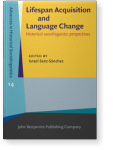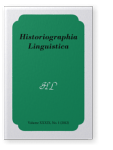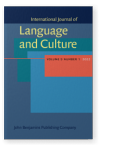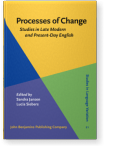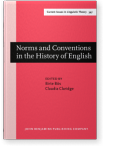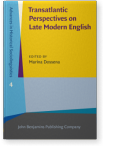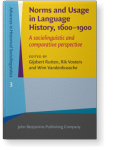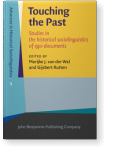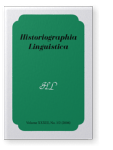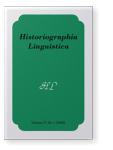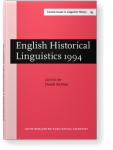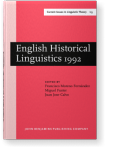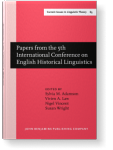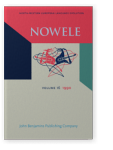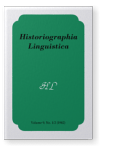Ingrid Tieken-Boon van Ostade
List of John Benjamins publications for which Ingrid Tieken-Boon van Ostade plays a role.
Book series
Title
Robert Lowth (1710-1787): The making of his grammar and its influence
Guest-edited by Ingrid Tieken-Boon van Ostade
Special issue of Historiographia Linguistica 39:1 (2012) vi, 183 pp.
Subjects History of linguistics
2022 Haagse Harry , a Dutch chav from The Hague? The enregisterment of similar social personas in different speech communities International Journal of Language and Culture 9:1, pp. 72–96 | Article
This paper presents two remarkably similar characterological figures who are stereotyped embodiments of working-class personas: Haagse Harry in The Hague and chavs in England. The two figures have similar attires, class positions, attitudes, and associated attributes. We compare and… read more
2019 Chapter 9. Attitudes to flat adverbs and English usage advice Processes of Change: Studies in Late Modern and Present-Day English, Jansen, Sandra and Lucia Siebers (eds.), pp. 159–182 | Chapter
Widespread as they are in non-standard and informal varieties of English, flat or suffixless adverbs are subject to prescriptive criticism when appearing in standard English. In the present study we repeated the survey by Mittins et al. (1970) in Attitudes to English Usage to investigate whether… read more
2019 Usage guides and the Age of Prescriptivism Norms and Conventions in the History of English, Bös, Birte and Claudia Claridge (eds.), pp. 1–22 | Chapter
Questioning the traditional association of the Age of Prescriptivism with the 18th century, this study distinguishes between prescription as a late stage in the English standardisation process and the subsequently arising prescriptivism, with possibly stronger roots in America than the UK. The… read more
2015 Five Hundred Mistakes Corrected: An early American English usage guide Transatlantic Perspectives on Late Modern English, Dossena, Marina (ed.), pp. 55–71 | Article
The anonymous Five hundred mistakes corrected (1856) is one of the very earliest American English usage guides. In its approach, contents and use of proscriptive metalanguage it fits into the tradition of usage guide writing, which had started in England nearly a century before and which continues,… read more
2014 Eighteenth-century English normative grammars and their readers Norms and Usage in Language History, 1600–1900: A sociolinguistic and comparative perspective, Rutten, Gijsbert, Rik Vosters and Wim Vandenbussche (eds.), pp. 129–150 | Article
Who were the readers of eighteenth-century normative English grammars? Because one grammar from the end of the century uniquely includes an elaborate list of subscribers, the work’s readership can be analysed. People who subscribed to Richard Postlethwaite’s Grammatical Art Improved (1795)… read more
2013 Flat adverbs and Jane Austen’s letters Touching the Past: Studies in the historical sociolinguistics of ego-documents, Wal, Marijke J. van der and Gijsbert Rutten (eds.), pp. 91–106 | Article
The stricture against flat adverbs, adverbs without the suffix -ly, originated in the eighteenth century. In a micro-level analysis of the epistolary language of Jane Austen, this paper focuses on her use of flat adverbs. Using flat adverbs herself, Jane Austen adopted them to mark her non-standard… read more
2012 Robert Lowth as a Codifier of the English Language: An introduction Robert Lowth (1710-1787): The making of his grammar and its influence, Tieken-Boon van Ostade, Ingrid (ed.), pp. 1–8 | Obituary
2012 “My imperfect attempt towards an English Grammar”: Lowth’s indebtedness to James Harris in revising his grammar Robert Lowth (1710-1787): The making of his grammar and its influence, Tieken-Boon van Ostade, Ingrid (ed.), pp. 61–75 | Article
This article provides an analysis of the only evidence that has — to the author’s knowledge — come down to us of the correspondence between the most authoritative 18th-century English grammarian Robert Lowth (1710–1787) and James Harris (1709–1780), author of the philosophical grammar Hermes… read more
2006 James Merrick (1720–1769): Poet, scholar, linguist New Approaches to the Study of Later Modern English, pp. 39–56 | Article
At the end of the preface to his Short Introduction to English Grammar (1762) Robert Lowth (1710–1787) makes an appeal for comments on his work. This article analyses his correspondence with James Merrick (1720–1769), a friend and fellow scholar, written between December 1761 and October 1764,… read more
2000 Robert Dodsley and the Genesis of Lowth’s: Short introduction to english grammar Historiographia Linguistica 27:1, pp. 21–36 | Article
On the basis of an analysis of the correspondence of the 18h-century London bookseller Robert Dodsley (1703–1764), a proposal is offered concerning the origin of Robert Lowth’s (1710–1787) Short Introduction to English Grammar (1762). The author presents arguments which suggest that Lowth’s… read more
1994 “After a copye unto Me Delyverd”: multiple negation in Malory’s Morte Darthur English Historical Linguistics 1992: Papers from the 7th International Conference on English Historical Linguistics, Valencia, 22–26 September 1992, Fernández, Francisco, Miguel Fuster Márquez and Juan Jose Calvo (eds.), pp. 353–366 | Article
1990 Exemplification in Eighteenth century grammars Papers from the 5th International Conference on English Historical Linguistics, Adamson, Sylvia M., Vivien A. Law, Nigel Vincent and Susan Wright (eds.), pp. 481–496 | Article
1982 Benjamin martin the linguist Historiographia Linguistica 9:1/2, pp. 121–133 | Article
Benjamin Martin (1704–82) was a versatile character whose interests and abilities were varied and wide-spread; moreover, he was reasonably successful in practically everything he undertook. However, in a biography by John R. Millburn, Benjamin Martin: Author, Instrument-maker, and ‘Country… read more
